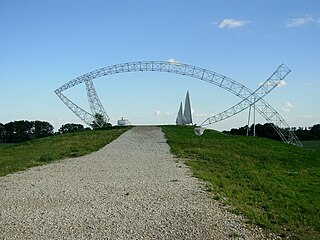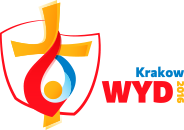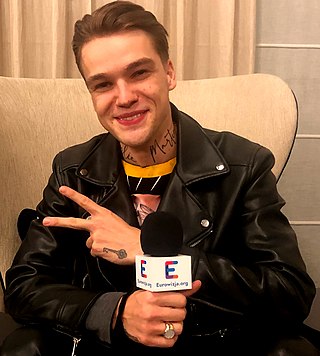
Esperanto is the world's most widely spoken constructed international auxiliary language. Created by L. L. Zamenhof in 1887, it is intended to be a universal second language for international communication, or "the international language". Zamenhof first described the language in Dr. Esperanto's International Language, which he published under the pseudonym Doktoro Esperanto. Early adopters of the language liked the name Esperanto and soon used it to describe his language. The word esperanto translates into English as "one who hopes".

Esperantujo or Esperantio is the community of speakers of the Esperanto language and their culture, as well as the places and institutions where the language is used. The term is used "as if it were a country."

The Pasporta Servo is a hospitality exchange service available both online and in print that lists people in Esperanto culture who are willing to offer free homestays to speakers of Esperanto. It is maintained by the World Esperanto Youth Organization (TEJO). The platform is a gift economy; hosts are not allowed to charge for lodging. Guests using the service are encouraged to speak only Esperanto with their hosts.

The World Esperanto Youth Organization is an organization dedicated to supporting young Esperanto speakers around the world and promote the use of Esperanto. TEJO was founded in 1938 as the Tutmonda Junular-Organizo and took its current name in 1952. In 1956, TEJO became the youth section of the Universal Esperanto Association (UEA). In 1971, the finances and administration of TEJO were fully integrated into those of UEA.
AIESEC is an international "youth-run" and led, non-governmental and not-for-profit organization that provides young people with business development internships. The organization focuses on empowering young people to make a progressive social impact. The AIESEC network includes approximately 40,000 members in 120+ countries.

The Esperanto Wikipedia is the Esperanto version of Wikipedia, which was started on 11 May 2001, alongside the Basque Wikipedia. With over 360,000 articles as of October 2024, it is the 37th-largest Wikipedia as measured by the number of articles, and the largest Wikipedia in a constructed language.

Croatia recognizes life partnerships for same-sex couples through the Life Partnership Act, making same-sex couples equal to married couples in almost all of its aspects. The Act also recognizes and defines unregistered same-sex relationships as informal life partners, thus making them equal to registered life partnerships after they have been cohabiting for a minimum of 3 years. Croatia first recognized same-sex couples in 2003 through a law on unregistered same-sex unions, which was later replaced by the Life Partnership Act. The Croatian Parliament passed the new law on 15 July 2014, taking effect in two stages. Following a 2013 referendum, the Constitution of Croatia has limited marriage to opposite-sex couples.

The International Youth Congress is the largest annual meeting of young Esperantists in the world. The participants come from all over the world for one week, and they usually number around 300, although there has been a congress with more than 1000 attendees before. The congress takes place in a different country every year and is organized by the World Esperanto Youth Organization, the youth wing of the Universal Esperanto Association. Both the IJK and the World Esperanto Congress take place each summer, usually in consecutive weeks but rarely in the same country.

Esperanto-USA (E-USA) is the largest organization for speakers and supporters of Esperanto in the United States. It was founded in 1952 as the Esperanto League for North America (ELNA) in Sacramento, California. Headquartered in Portland, Maine, Esperanto-USA is a 501(c)(3) nonprofit organization and the U.S. affiliate of the Universal Esperanto Association. Brandon Sowers is President of E-USA, and Quintyn Bobb is Vice-President.

The Poland-wide Youth Meeting Lednica 2000 is an annual gathering of Polish Catholic youth, organized near Gniezno in Pola Lednickie. It is the largest regular religious youth meeting in the world.
Amazon Pay is an online payments processing service owned by Amazon. Launched in 2007, Amazon Pay uses the consumer base of Amazon.com and focuses on giving users the option to pay with their Amazon accounts on external merchant websites. As of October 2024, the service was available to businesses based in 18 countries: Austria, Belgium, Cyprus, Denmark, France, Germany, Hungary, the Republic of Ireland, Italy, Japan, Luxembourg, Netherlands, Portugal, Spain, Sweden, Switzerland, United Kingdom, and the United States.

FESTO is an annual week-long Esperanto youth meeting organized by Espéranto-Jeunes, the French branch of the Universal Esperanto Association's youth wing TEJO. It is held in a different city every summer and serves as a venue for cultural exchange, offering an occasion for Esperantists from many lands to improve their facility in the Esperanto language. Except in 2009 and 2013, meetings have been held in France.

Peter Baláž, in Esperanto known as Petro, is an Esperantist, publisher and editor; he was selected as the 2012 Esperantist of the Year. Baláž lives in his hometown of Partizánske and speaks Slovak, Czech, German, Polish, Russian and English, as well as the international constructed language Esperanto.

World Youth Day 2016 was the 15th World Youth Day, an international event organised by the Catholic Church and focused on faith and youth that took place from 26 to 31 July 2016 in Kraków, Poland. It was the third World Youth Day held in Central Europe.

PayU is a Netherlands-based payment service provider to online merchants. The company was founded in 2002, and is headquartered in Hoofddorp. It allows online businesses to accept and process payments through payment methods that can be integrated with web and mobile applications. As of 2018, the service is available in 17 countries. The firm is owned by the Naspers Group, which also owns a stake in one of its sister companies, Tencent.

Mikoláš Josef, also known mononymously as Mikolas, is a Czech singer-songwriter and former model. He represented the Czech Republic in the Eurovision Song Contest 2018 in Lisbon, Portugal, with the song "Lie to Me", and finished in sixth place, the best result for the Czech Republic in Eurovision history.

The following outline is provided as an overview of and topical guide to Esperanto:

Belgrade Pride is an annual pride parade held in Belgrade, Serbia to celebrate the lesbian, gay, bisexual, and transgender (LGBT) people and their allies. The first event was held in June 2001. Since 2014, Belgrade Pride has been organized annually without bans. The manifestation is a part of the Belgrade Pride Week, which in addition to the pride parade itself also includes cultural events, workshops, discussion panels, parties and a live concert as the closing event.















